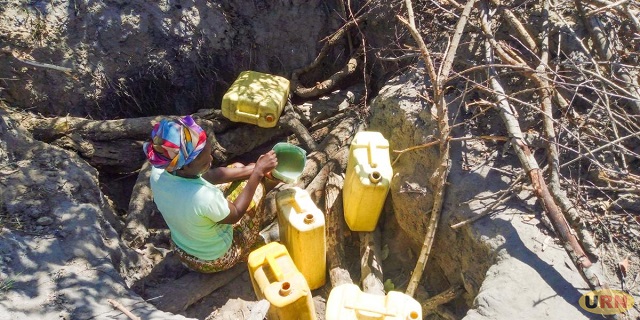
Amolatar, Uganda | THE INDEPENDENT | Persistent shortage of clean and safe water is posing a major health risk to communities in Amolatar district. The district faces a deepening water crisis, where dozens of water points have submerged, leaving communities desperate for clean water.
Out of the 561 domestic water points serving over 157,142 people, 121 water points have been non-functional for over 5 years and are considered abandoned.
The district has only one piped scheme. Data obtained from the district indicate that less than 50 percent of the 581 villages in the district have clean and safe water.
According to the National Water Supply Atlas, the average access to clean and safe water stands at 65 percent.
Geoffrey Ocen, the LCV Chairperson, attributed the water crisis to limited funding from the government but disclosed that they may be able to drill a few deep boreholes to replace the old ones, if funding allows.
Daisy Ekaa Awongo, the Amolatar Acting Principal Assistant Secretary, decried the limited funding from the government, explaining that the inadequate funding received under water and sanitation is always used to rehabilitate boreholes, thus providing clean water for her people.
However, Prince of Peace, Orphans and Widows (POPOW), an NGO, has offered their support, providing clean, safe water to institutions, especially schools and their surrounding communities.
With support from the U.S.-based Surge for Water, the NGO has been constructing sanitary facilities and solar-powered water points in schools. Early this month, POPOW installed the water system, which has a capacity to produce 20,000 litres of water per hour at Aputi Primary School.
This will also serve 3,723 households spread across seven villages surrounding the school. Ekaa Awongo believes that such interventions have greatly improved the district’s water coverage.
She is optimistic that “By the end of the project, other sub-counties will have 90 percent water and latrine coverages with support from POPOW.”
Joel Anam, the head teacher of Aputi Primary School, where a 20,000-litre capacity water plant has been installed, says this will address the challenge of staff and pupil absenteeism due to a lack of sanitary facilities.
POPOW piloted their project in the sub-counties of Aputi and Akwon, but they have since extended services to Abeja, Acii, Muntu, and Namasale Town Council with the hope of extending to the rest of the sub-counties across the district.
Peter Ocheng, the program manager in Amolatar district, believes that by providing clean water, the organisation will be fighting poverty and domestic violence in the community as well as addressing the sanitation problem of open defecation.
The organisation also provides reusable sanitary pads and menstrual health training for girls, while ensuring boys are equally engaged. It also supports the education of orphans and other vulnerable children in the community.
*****
URN
 The Independent Uganda: You get the Truth we Pay the Price
The Independent Uganda: You get the Truth we Pay the Price





